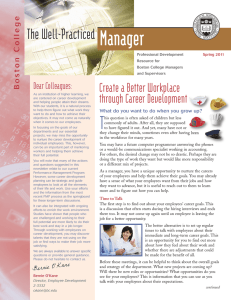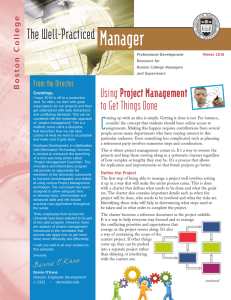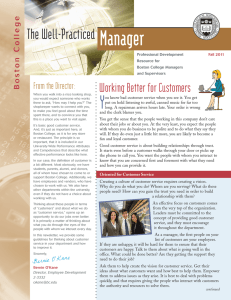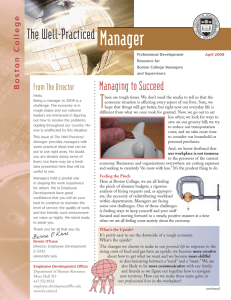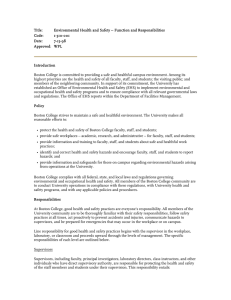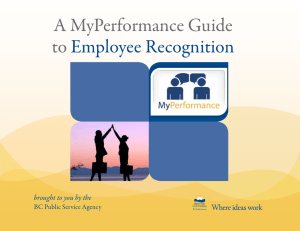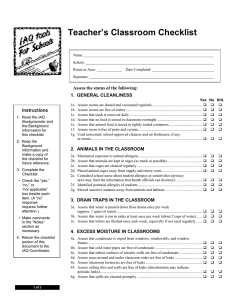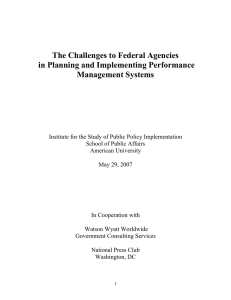Manager D The Well-Practiced Don’t Waste Time:
advertisement
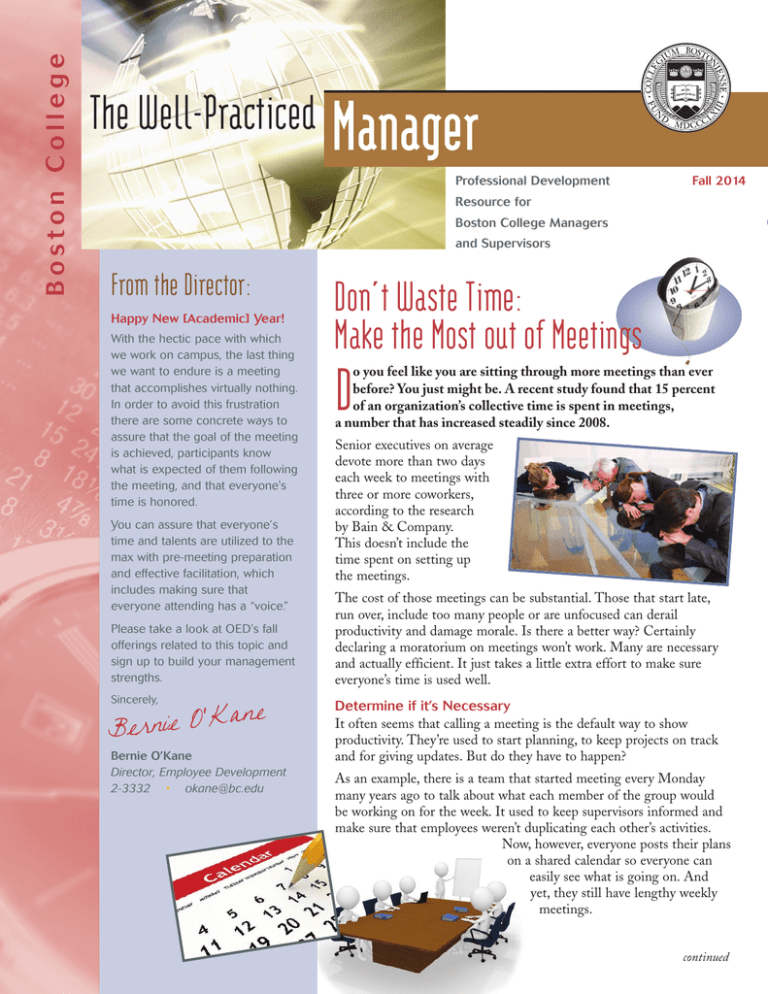
Boston College The Well-Practiced Manager Professional Development Fall 2014 Resource for Boston College Managers and Supervisors From the Director: Happy New [Academic] Year! With the hectic pace with which we work on campus, the last thing we want to endure is a meeting that accomplishes virtually nothing. In order to avoid this frustration there are some concrete ways to assure that the goal of the meeting is achieved, participants know what is expected of them following the meeting, and that everyone's time is honored. You can assure that everyone’s time and talents are utilized to the max with pre-meeting preparation and effective facilitation, which includes making sure that everyone attending has a “voice.” Please take a look at OED's fall offerings related to this topic and sign up to build your management strengths. Sincerely, ane K ’ O e i n r e B Bernie O’Kane Director, Employee Development 2-3332 • okane@bc.edu Don’t Waste Time: Make the Most out of Meetings o you feel like you are sitting through more meetings than ever before? You just might be. A recent study found that 15 percent of an organization’s collective time is spent in meetings, a number that has increased steadily since 2008. D Senior executives on average devote more than two days each week to meetings with three or more coworkers, according to the research by Bain & Company. This doesn’t include the time spent on setting up the meetings. The cost of those meetings can be substantial. Those that start late, run over, include too many people or are unfocused can derail productivity and damage morale. Is there a better way? Certainly declaring a moratorium on meetings won’t work. Many are necessary and actually efficient. It just takes a little extra effort to make sure everyone’s time is used well. Determine if it’s Necessary It often seems that calling a meeting is the default way to show productivity. They’re used to start planning, to keep projects on track and for giving updates. But do they have to happen? As an example, there is a team that started meeting every Monday many years ago to talk about what each member of the group would be working on for the week. It used to keep supervisors informed and make sure that employees weren’t duplicating each other’s activities. Now, however, everyone posts their plans on a shared calendar so everyone can easily see what is going on. And yet, they still have lengthy weekly meetings. continued 2 When you’re planning a meeting, make sure participants know what to expect. Give them information ahead of time so they can come prepared including: What is the purpose of the meeting? Where and when will the meeting take place? Who should attend? What topics will be covered and in what order? How much time will be spent on each topic? What role will participants have? What should participants bring? What should be participants be prepared to share? Editorial Services provided by Jennifer Powell, The Excellent Writers excellentwriters.com Graphic Design by Tania Fine Helhoski, BirdDesign www.birddesignstudio.com Define What You Want to Accomplish To determine whether a meeting has to happen, be very clear about the goals. ■ For instance, you may need people together for a brainstorming session that couldn’t be replaced with email. Or, you may want people to be able to comment on what others are doing. Sometimes, you may just want team members to get together so they can get to know each other better. ■ ■ ■ ■ ■ ■ ■ ■ ■ ■ ■ ■ Being clear about why you are calling the meeting will help you decide what should happen during the meeting, which can go a long way toward making it worthwhile. ■ ■ ■ ■ ■ ■ ■ Set a Straightforward Agenda Once you know what your goals, figure out what has to happen to meet them. Should everyone talk? Will there be a presentation followed by a question and answer session? Do you need a team building exercise? ■ Set up an outline for the meeting including how much time you expect to spend on each agenda item. This will help avoid time consuming tangents and extraneous conversations. Before the meeting, you may want to ask participants if there are any issues they want to raise so you can prepare. ■ ■ ■ ■ ■ ■ Run the Meeting Well The ultimate success of a meeting depends on strong leadership. Even if several people will talk, it will go more smoothly if just one person is in charge of moving things along. That person should have the authority to stop off-track conversations and ensure that everyone is getting a chance to speak. Use the agenda as a time guide. If you are going over on a particular item, determine whether you can hurry the discussion, defer it until later or assign the matter to a subcommittee. If you can’t, consider whether you can cut another agenda item to make up the time. ■ ■ ■ ■ ■ ■ ■ ■ ■ If people try to raise issues outside of the agenda, ask them to follow up with you later rather than taking up the time of people who don’t need to be involved or suggest that it be put into a “parking lot” to be taken up at another time. ■ ■ ■ ■ ■ ■ ■ Keep an eye on your audience. If you seem to be losing people’s attention, try asking questions or find a way to move things along more quickly. ■ Share the agenda ahead of time so people will know what to expect and can come prepared. ■ ■ ■ ■ ■ ■ ■ ■ ■ ■ ■ ■ ■ Employee Development Office Department of Human Resources • 129 Lake Street 617.552.8532 • employee.development@bc.edu • www.bc.edu/ed
